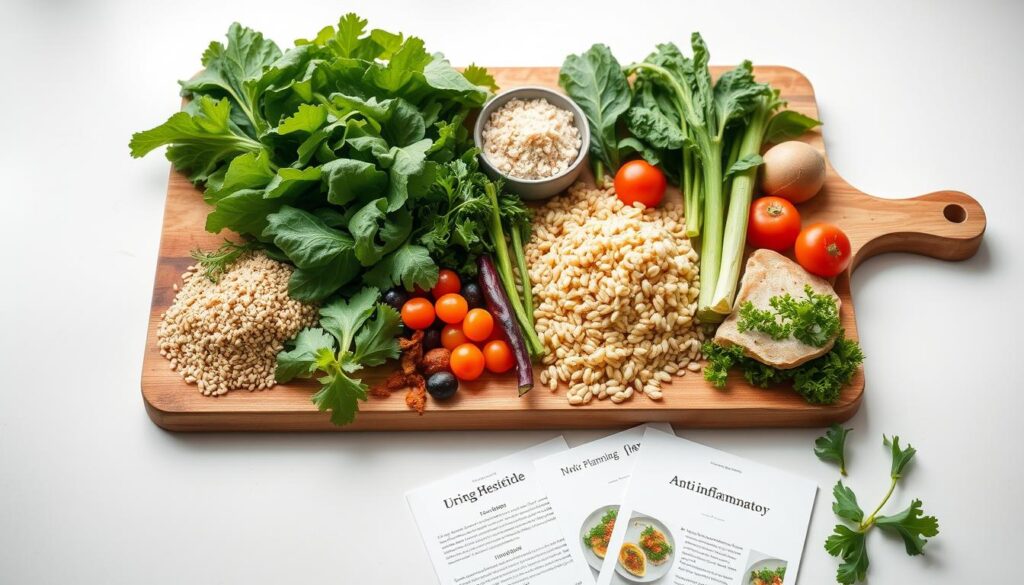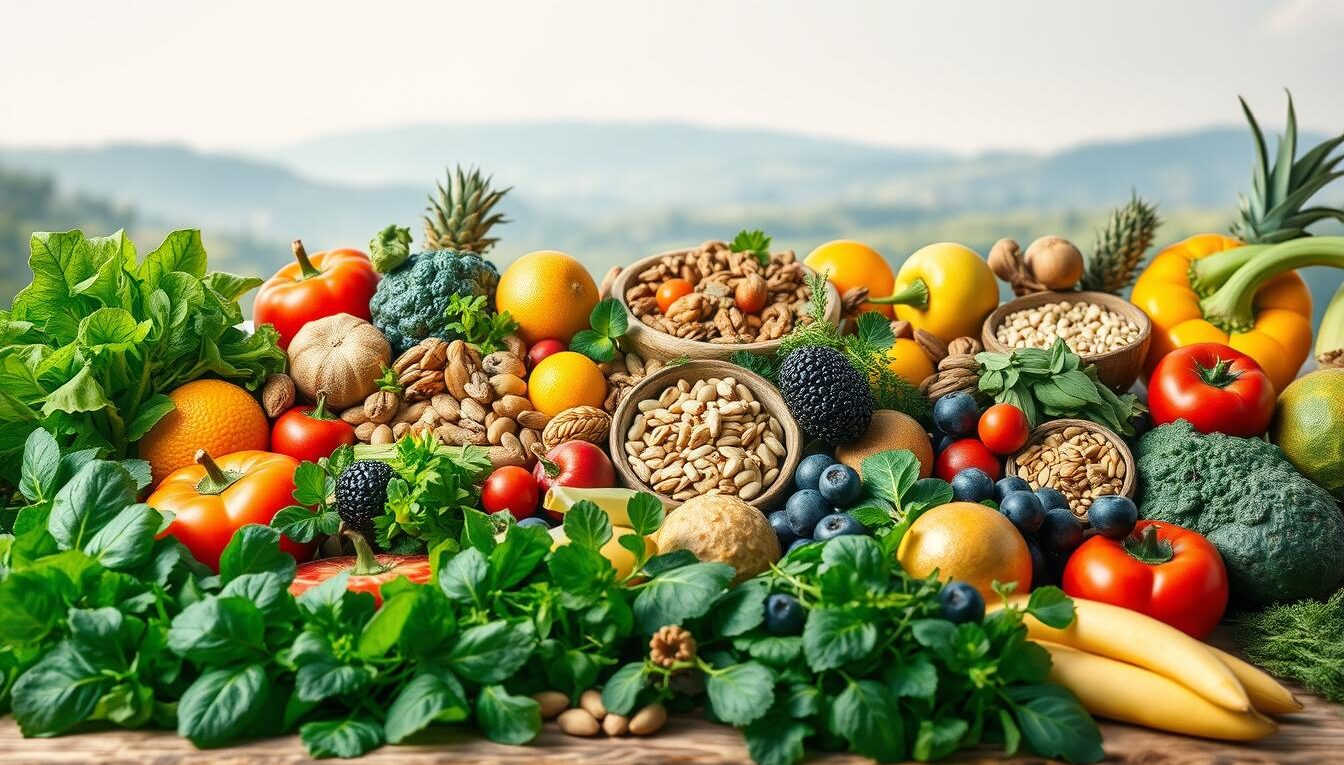Essential Anti-Inflammatory Foods for Wellness
Eating a balanced diet rich in anti-inflammatory foods is crucial for maintaining overall wellness. A healthy diet helps manage inflammation, promoting a state of well-being and reducing the risk of chronic diseases.
Incorporating the right foods into your nutrition plan can significantly impact your health. Healthy eating habits are essential for preventing inflammation and supporting overall health.
Key Takeaways
- Including anti-inflammatory foods in your diet can help reduce inflammation.
- A balanced diet is key to maintaining overall wellness.
- Healthy eating habits play a crucial role in preventing chronic diseases.
- Nutrition rich in essential nutrients supports overall health.
- A well-planned diet can significantly impact your well-being.
Understanding Inflammation in the Body
Inflammation is a complex biological response that is often misunderstood, playing a crucial role in our body’s defense mechanism. It’s a natural process that occurs when the body detects harm or pathogens, aiming to protect and heal itself.
Acute vs. Chronic Inflammation
There are two main types of inflammation: acute and chronic. Acute inflammation is a short-term response to injury or infection, characterized by redness, swelling, and pain. It’s a necessary response that helps the body heal. On the other hand, chronic inflammation is a prolonged and persistent inflammatory response that can lead to various health issues.
Chronic inflammation can result from unresolved acute inflammation, autoimmune disorders, or long-term exposure to irritants. It’s a silent condition that can affect different parts of the body, often without noticeable symptoms until significant damage has occurred.
How Inflammation Affects Overall Health
Inflammation can have a significant impact on our overall health, affecting multiple systems in the body. Chronic inflammation has been linked to various conditions, including cardiovascular disease, diabetes, and even mental health disorders. It can also exacerbate existing health issues, making it a critical factor to consider in maintaining overall wellness.
Common Inflammatory Conditions
Some common conditions associated with inflammation include arthritis, asthma, and certain gastrointestinal diseases. Arthritis, for example, involves inflammation of the joints, leading to pain and stiffness. Understanding these conditions and their link to inflammation can help in managing and potentially preventing their progression.
- Arthritis
- Asthma
- Gastrointestinal diseases (e.g., Crohn’s disease, ulcerative colitis)
By recognizing the role of inflammation in these conditions, individuals can take proactive steps towards reducing their risk and managing symptoms through lifestyle changes, including dietary adjustments.
The Connection Between Diet and Inflammation
The relationship between diet and inflammation is complex, with certain foods either exacerbating or alleviating inflammatory responses in the body. As we explore this connection, it becomes clear that dietary choices play a significant role in managing inflammation.
How Food Influences Inflammatory Responses
Food can either fuel or fight inflammation. Pro-inflammatory foods tend to be high in refined carbohydrates, added sugars, and unhealthy fats, which can trigger or worsen inflammation. On the other hand, anti-inflammatory foods are rich in nutrients and bioactive compounds that help mitigate inflammatory responses.
Nutrients like omega-3 fatty acids, antioxidants, and fiber have been shown to have anti-inflammatory effects. Foods rich in these nutrients, such as fatty fish, leafy greens, and whole grains, can help reduce inflammation and promote overall health.
Bioactive Compounds That Fight Inflammation
Bioactive compounds found in various foods have potent anti-inflammatory properties. For example, polyphenols in fruits, vegetables, and whole grains have been shown to reduce inflammation and oxidative stress. Similarly, curcumin, a compound found in turmeric, has potent anti-inflammatory and antioxidant effects.
- Polyphenol-rich foods: berries, green tea, dark chocolate
- Omega-3 rich foods: fatty fish, flaxseeds, walnuts
- Antioxidant-rich foods: leafy greens, bell peppers, tomatoes
The Western Diet and Inflammatory Patterns
The Western diet, characterized by high intake of processed meats, refined grains, and added sugars, has been linked to increased inflammation. This dietary pattern can lead to chronic inflammation, contributing to various health conditions, including cardiovascular disease, diabetes, and obesity.
Adopting an anti-inflammatory diet rich in whole, nutrient-dense foods can help mitigate the negative effects of the Western diet. By making informed food choices, individuals can take a proactive approach to managing inflammation and promoting overall well-being.
Anti-Inflammatory Foods You Should Know About
Anti-inflammatory foods are not just good for you; they’re essential for maintaining a healthy body. By incorporating the right foods into your diet, you can significantly reduce inflammation and improve your overall well-being.
The Science Behind Food as Medicine
The concept of “food as medicine” is gaining traction as research continues to uncover the powerful effects of nutrition on our health. Certain foods contain bioactive compounds that can help mitigate inflammation, which is at the root of many chronic diseases.
Nutrients like omega-3 fatty acids, antioxidants, and fiber play a crucial role in combating inflammation. These nutrients can be found in a variety of whole foods, making it easier to build an anti-inflammatory diet.
Key Nutrients That Combat Inflammation
Some of the key nutrients that help fight inflammation include:
- Omega-3 fatty acids: Found in fatty fish, flaxseeds, and walnuts, these healthy fats are known for their anti-inflammatory properties.
- Antioxidants: Berries, leafy greens, and other fruits and vegetables are rich in antioxidants, which help protect cells from damage.
- Fiber: Whole grains, legumes, and certain vegetables are high in fiber, which can help reduce inflammation in the gut.
Building an Anti-Inflammatory Eating Pattern
Creating an anti-inflammatory eating pattern involves more than just adding certain foods to your diet; it’s about adopting a balanced approach to nutrition. Here are some tips:
- Focus on whole, unprocessed foods like vegetables, fruits, whole grains, and lean proteins.
- Incorporate a variety of colorful fruits and vegetables into your meals.
- Choose healthy fats like olive oil, avocado, and nuts.
- Limit your intake of processed and sugary foods.
By making these dietary changes, you can help reduce inflammation and improve your overall health. Remember, it’s about progress, not perfection – every small change counts.
Powerful Plant-Based Anti-Inflammatory Foods
Embracing a plant-based diet can be a powerful strategy against chronic inflammation. By incorporating a variety of whole, nutrient-dense foods, individuals can significantly reduce their risk of inflammatory-related diseases. This section highlights some of the most potent plant-based anti-inflammatory foods.
Leafy Greens and Cruciferous Vegetables
Leafy greens like spinach and kale are rich in antioxidants and other nutrients that help combat inflammation. Cruciferous vegetables, such as broccoli and cauliflower, contain sulforaphane, which has been shown to have potent anti-inflammatory effects.
Berries and Colorful Fruits
Berries, including blueberries and raspberries, are packed with anthocyanins and other polyphenols that reduce inflammation. Other colorful fruits like pomegranates and oranges are also rich in vitamins and flavonoids that help mitigate inflammatory responses.
Nuts, Seeds, and Legumes
Nuts and seeds, such as almonds and chia seeds, are excellent sources of healthy fats and antioxidants. Legumes, including lentils and chickpeas, are rich in fiber and protein, making them highly effective at reducing inflammation.
Herbs and Spices with Anti-Inflammatory Properties
Certain herbs and spices have been used for centuries for their anti-inflammatory properties. Turmeric, with its active compound curcumin, is a well-known example. Other beneficial herbs and spices include ginger, cinnamon, and rosemary, each offering unique anti-inflammatory benefits.
By incorporating these plant-based foods into daily meals, individuals can take a proactive approach to managing inflammation and promoting overall health.
Omega-Rich Foods for Fighting Inflammation
Omega-3 fatty acids, found in various foods, play a crucial role in reducing inflammation in the body. These essential fatty acids are known for their anti-inflammatory properties, which can help in managing and preventing chronic inflammatory conditions.
Fatty Fish and Seafood Options
Fatty fish and seafood are among the richest sources of omega-3 fatty acids, particularly EPA and DHA. These nutrients are vital for reducing inflammation and promoting overall health.
- Salmon: Rich in EPA and DHA, salmon is an excellent choice for reducing inflammation.
- Sardines: These small fish are packed with omega-3s and are often less contaminated with mercury than larger fish.
- Mackerel: Another fatty fish, mackerel is a good source of omega-3 fatty acids.
Plant Sources of Omega-3 Fatty Acids
While fatty fish are a well-known source of omega-3s, there are also several plant-based sources. These include:
- Chia Seeds: Rich in ALA, chia seeds are a versatile addition to meals.
- Flaxseeds: Another good source of ALA, flaxseeds can be easily incorporated into your diet.
- Walnut: Walnuts are a tasty way to consume ALA, an omega-3 fatty acid.
Balancing Omega-3 and Omega-6 Intake
It’s essential to balance your intake of omega-3 and omega-6 fatty acids. While both are important, a typical Western diet tends to be high in omega-6s, which can promote inflammation if not balanced with sufficient omega-3s.
| Food Type | Omega-3 Content | Omega-6 Content |
|---|---|---|
| Salmon | High | Low |
| Chia Seeds | High (ALA) | Low |
| Safflower Oil | Low | High |
Cooking Methods That Preserve Omega Benefits
The way you cook your food can significantly impact the retention of omega-3 fatty acids. Gentle cooking methods such as steaming or baking are recommended over high-heat frying.
By incorporating omega-rich foods into your diet and being mindful of cooking methods, you can harness the anti-inflammatory benefits of these essential nutrients.
Fermented Foods and the Gut-Inflammation Connection
Gut health is intricately linked with overall inflammation, and incorporating fermented foods can be a game-changer. The connection between the gut microbiome and inflammatory responses is complex, involving various biochemical pathways and interactions.

How Gut Health Influences Inflammation
The gut microbiome plays a crucial role in regulating the immune system and influencing inflammation. An imbalance in the gut microbiota, also known as dysbiosis, can lead to increased inflammation and contribute to various chronic conditions. Maintaining a healthy gut microbiome is essential for overall well-being.
Research has shown that the gut and brain are connected through the gut-brain axis, and this bidirectional communication network can significantly impact inflammatory responses. A healthy gut microbiome produces anti-inflammatory cytokines and other beneficial compounds that help reduce inflammation.
Top Probiotic-Rich Foods to Include
Probiotics are live microorganisms that confer health benefits when administered in adequate amounts. Incorporating probiotic-rich foods into your diet can help support gut health and reduce inflammation. Some of the top probiotic-rich foods include:
- Yogurt (especially those with live and active cultures)
- Sauerkraut
- Kimchi
- Kefir
- Miso
- Tempeh
“The right probiotics can help calm the inflammatory response and promote a balanced gut microbiome.”
Prebiotic Foods That Support Gut Health
Prebiotics are non-digestible fibers that serve as food for beneficial bacteria in the gut, promoting a healthy microbiome. Including prebiotic-rich foods in your diet can enhance the effects of probiotics and support gut health. Some prebiotic-rich foods are:
- Asparagus
- Bananas
- Onions
- Garlic
- Whole wheat bread
- Oats
Building a Microbiome-Friendly Diet
Creating a diet that supports a healthy microbiome involves incorporating a variety of whole, nutrient-dense foods. Aim to include a mix of probiotic and prebiotic foods to promote a balanced gut microbiome. Additionally, limiting processed foods and sugars can help reduce inflammation and support overall gut health.
As Dr. Emeran Mayer notes in his book “The Gut-Immune Connection,”
“A healthy gut microbiome is crucial for a well-functioning immune system and overall health.”
By focusing on fermented foods, probiotics, and prebiotics, individuals can take a proactive approach to managing inflammation and promoting overall wellness.
Foods to Avoid That Promote Inflammation
To manage inflammation effectively, it’s essential to identify and avoid inflammatory foods. The modern diet often includes a variety of foods that can trigger or worsen inflammatory responses in the body.
Refined Carbohydrates and Added Sugars
Refined carbohydrates and added sugars are known to promote inflammation. Foods like white bread, sugary snacks, and sweetened beverages can cause a spike in blood sugar and insulin resistance, leading to increased inflammation.
Processed Meats and Trans Fats
Processed meats, such as hot dogs and sausages, contain advanced glycation end (AGE) products that stimulate inflammation. Trans fats, found in partially hydrogenated oils, also exacerbate inflammatory responses.
Common Food Sensitivities and Inflammation
Food sensitivities, particularly to gluten and dairy, can cause significant inflammation in sensitive individuals. Identifying and avoiding trigger foods is crucial for reducing inflammation.
Alcohol and Inflammatory Responses
Excessive alcohol consumption can lead to increased inflammation in the body. Alcohol can disrupt the gut barrier, leading to the release of pro-inflammatory cytokines.
| Food Category | Examples | Inflammatory Effects |
|---|---|---|
| Refined Carbohydrates | White bread, sugary snacks | Spikes blood sugar, insulin resistance |
| Processed Meats | Hot dogs, sausages | Contains AGE products, stimulates inflammation |
| Trans Fats | Partially hydrogenated oils | Exacerbates inflammatory responses |
Practical Anti-Inflammatory Meal Plans and Recipes
Adopting an anti-inflammatory diet requires some planning, but the benefits are well worth it. By incorporating the right foods and meal strategies, you can significantly reduce inflammation and improve your overall health.
Building a Daily Anti-Inflammatory Menu
To start, focus on adding a variety of anti-inflammatory foods to your daily meals. This includes leafy greens, berries, nuts, and fatty fish. A colorful plate often indicates a nutrient-rich meal.
For breakfast, consider oatmeal with berries and nuts. For lunch, a salad with grilled salmon and avocado is a great option. Dinner could be a stir-fry with turmeric, ginger, and a variety of vegetables.
Simple Swaps for Inflammatory Foods
Making simple swaps in your diet can have a significant impact. Replace refined carbohydrates with whole grains, and choose lean proteins over processed meats.
- Swap white bread for whole-grain bread.
- Choose brown rice over white rice.
- Opt for grilled chicken instead of processed deli meats.
Meal Prep Strategies for Success
Effective meal prep is key to maintaining an anti-inflammatory diet. Plan your meals around seasonal produce to ensure freshness and variety.
Breakfast Options
Prepare overnight oats with almond milk, chia seeds, and berries for a quick breakfast.
Lunch and Dinner Ideas
Grill a batch of chicken or salmon at the beginning of the week and use it in salads or as a protein source in meals.
Snacks and Desserts
Keep anti-inflammatory snacks like nuts, fruits, and dark chocolate on hand. For desserts, try making a fruit salad with a dollop of coconut cream.

Tracking Progress on an Anti-Inflammatory Diet
Keep a food diary to track how different foods affect your body. Note any changes in energy levels, digestion, or overall well-being.
By being mindful of your diet and making informed choices, you can harness the power of anti-inflammatory foods to enhance your health.
Conclusion: Embracing an Anti-Inflammatory Lifestyle
Adopting an anti-inflammatory lifestyle is a powerful step towards achieving overall wellness. By incorporating anti-inflammatory foods into your diet and avoiding pro-inflammatory ones, you can significantly reduce chronic inflammation and promote healthy eating habits.
The key is to focus on whole, nutrient-dense foods like leafy greens, berries, and omega-rich fish, while limiting processed and high-sugar foods. By making these dietary changes, you can help mitigate inflammation and support your body’s natural healing processes.
As you embark on this journey, remember that small changes can add up over time. Start by introducing more anti-inflammatory foods into your meals and gradually work towards a balanced diet that supports your overall wellness. By doing so, you’ll be taking a proactive approach to maintaining a healthy lifestyle and reducing the risk of chronic diseases.


